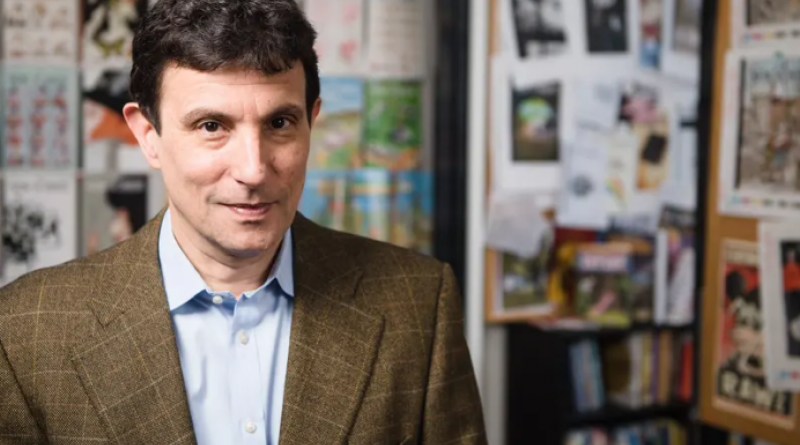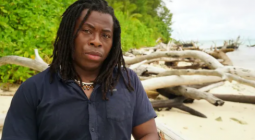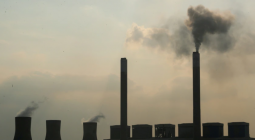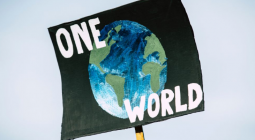David Remnick: ‘There is no vaccine for climate change’

The New Yorker editor on Fragile Earth, a new collection of the magazine’s climate crisis writing, the continuing dangers of Trumpism – and seeing his family for the first time in a year
David Remnick has been the editor of the New Yorker since 1998. The Fragile Earth, a selection of the writing that has appeared in the magazine about climate change, is out now.
You say that as a young reporter you wrote quite a lot about dramatic weather events. Can you remember when those localised storms and fires and floods started to suggest something more apocalyptic?
When I was at the Washington Post, Len Downie, Ben Bradlee’s successor as editor, was obsessed with “weather stories” and played them big. And there was much high-minded, wise-guy joking about this, as if it were the height of ordinariness. But when I think back on it, Downie was right. Weather is what envelops and affects us all. And our decades-long heedlessness to climate change has done great damage to the world. So when we think about all of these unusual storms and fires, these are no longer “weather stories” – banalities, part of the nature of things – they aren’t merely that. They’re exacerbated by human behaviour over time and they are harbingers of worse.
The pandemic – and the waves of conspiracy and disinformation it has generated – has sometimes seemed like a dry run for a climate catastrophe. What lessons might we take from that?
I totally agree with that. Think of the colossal loss that the pandemic has caused and goes on causing, the death and illness, the dislocation, the pain, the economic damage. Think of the way it defeated the leaderships of so many countries – particularly here in the US – the way it exposed the deep flaws in even the wealthiest and most scientifically advanced countries in the world. Think of the disarray, the loss of life, the mental anguish and the economic devastation, the social division, the refusal, among so many, even to believe in scientific reality. And yet with Covid-19, while we still face more “waves” and loss, there is an end in sight – thanks largely to the increasing distribution of vaccines. But climate change will not have a vaccine, a relatively singular solution, and certainly not on a short timeline. We have to understand that the damage we have been doing to our planet, to ourselves, is already exacting a terrible price and scientists make it plain that this damage, this loss, will increase rapidly if we continue on our idiotic and self-defeating course. Pfizer and Moderna and the rest will not be there to lower sea levels or put out the fire.
Jonathan Safran Foer in his recent book We Are the Weather suggested that we in the all-consuming developed world should each make a personal climate pledge – only fly once or twice a year, only eat meat once a week or whatever. Do you see any value in that?
Every individual can do things to help, to be more mindful. But without serious political initiatives on a national and global level, we are in grave trouble. So, yes, limiting flights, waste, changing habits, that can only help. But it will not be decisive. As so many of the pieces in The Fragile Earth suggest, the climate emergency demands political imagination and initiative on a truly global level. We’ve yet to achieve that. The Paris accords are hardly decisive. In the United States, the Trump years will be remembered as a threat to democracy, to decency, to immigrants, to black and brown people – you know the litany. But the tragedy runs even deeper. Trump led a government that was hostile to the environment, to our common future. He encouraged countless people to believe, along with him, that environmentalism was something vaguely comic. He answered the demands of the planet with mockery. Recall all his monologues about “wind”, as if alternative energy sources were just the most hilarious things imaginable. It’s incumbent on Biden, and on other world leaders, to coordinate their efforts with a sense of urgency – and for their populations to push them to do so. The price of further delay will be calculated in the loss of life, the loss of a truly sustainable planet. Read Bill McKibben’s piece The End of Nature, which begins the anthology. We’ve known the score for a very long time.
It was sobering to be reminded of how, when it first came out in 1989, McKibben’s report was greeted as “earnest, doom-ridden, precious and tear-stained” even by observers such as Lewis Lapham. Do we remain in a struggle for the right “tone” to describe the crisis?
One of the colossal challenges of confronting climate change is psychological. There is always another more immediate-seeming crisis to focus on and confront and I mean very real crises such as the threat to democracy, racial injustice, the pandemic. The difficulty of getting people and governments to focus their attention, concerns and capacity for action on tiny-seeming shifts in the weather is incredibly difficult even now when the effects are upon us; imagine how difficult it was when only a few lonely scientific voices, such as James Hansen, and journalists, such as Bill McKibben, were sounding the alarm. They were dismissed – if they were paid attention to at all – as alarmists, hysterics, preposterous. But I do think that, despite the best efforts of deniers such as Trump and so many others, the message is getting through. Witness the new infrastructure bill in the US, which is, in many ways, a climate bill, as well.
You mention the crisis of democracy of the Trump years. Do you believe there is danger in thinking of the events at the Capitol on 6 January as the end of something, rather than the beginning?
It’s certainly an infinitely better thing that Biden won the election – and won it without question – but it would be foolish to ignore the fact that Trumpism persists. It persists in the Senate and the House of Representatives. It persists in the electorate, which chose to support Trump in the tens of millions. And, in the most concentrated, violent forms, it persists in the groups and militias that were represented at the Capitol and are hiding in plain sight all over the country. Our own government makes it plain that we have more to fear from domestic terrorism than from any foreign group.
That crisis of democracy plays out on social media. I notice you steer clear of Twitter – what’s your broad view of its effect?
I completely recognise all the good that Twitter can provide – at its best you can learn a lot quickly, you hear from voices that did not have a platform before – and so I do look at it fairly often but I suppose I decided early on, rightly or not, that people in jobs like mine either tend to be boring and promotional on Twitter (“We have a great piece on…”) or they, sooner or later, step on a mine that does them or their publication no good. And honestly, I worried about focus, a precious commodity, so, while I do spend time on Twitter, I decided not to sign up.
At the same time, it seems to me, we are living in a golden age of “long-form” reporting. Is the New Yorker finding a younger generation of readers?
Happily, yes. Early on, when I used to talk with young internet visionaries and executives, they would all say: “No one will read anything long online.” It was an article of faith! Thankfully, that turned out to be nonsense. People have a hunger for depth, for knowing something real, for pieces of writing that take their time. Look at Raffi Khatchadourian’s piece in the New Yorker this week about Xinjiang. It is hardly a hot take; it takes a while to read. But it’s a piece of reporting that is so deep, so human and humane, that it becomes impossible for the reader to ignore or forget the human-rights disaster that is being enacted now, today, right now, in western China. It is something that stays with you and might even help change things.
I guess like all writers you are used to some of the isolations of this past year, but are there things – good and bad – you’ve learned about yourself during the periods of lockdown?
I’ve learned that I can live easily without wearing proper shoes, et cetera, but I really miss… people. The other night I went to a basketball game at the Barclays Center, in Brooklyn. Just to get inside you either had to present proof of vaccination or a negative test. Then they took your temperature. The arena was one-tenth filled, at most, and yet it was pure joy. Like bursting out of a cave and into the light. I went with my brother and nephew. I hadn’t seen them in more than a year. That kind of separation is nearly universal. Imagine that: families and friends all over the world disconnected over time in countless ways. What has been the effect on those countless relationships? My mother, who was severely disabled for a long time, died a year before the pandemic and, much as I miss her and mourn her loss, I don’t know how either one of us could have managed the separation that Covid has demanded, logistically or emotionally. I’d guess that the implications of Covid’s effect on human relationships will keep novelists and artists busy for a long time to come.
Cities have had a chance to take a breath over the last year. How optimistic are you that they will “build back better”?
My instinct, as a New York patriot, as someone who, even now, cannot believe my good fortune of living in this city, is to say, of course! Never count New York out! But sentimentality and a chorus of Frank Sinatra or Jay-Z are not going to do the trick – not in New York, not in any city, where the effect of the pandemic on human beings, on small businesses, on schools and schoolchildren, has been so profound. Right now, New York is going through a mayoral race. You would hardly know it’s happening, somehow. It’s hard for everyone to focus on… everything. But the ramifications of how New York is led as Bill de Blasio and, possibly, Andrew Cuomo, exit the scene will be immensely important to the future of New York.





